Noble pen shells: The effort to save these suddenly endangered giant clams
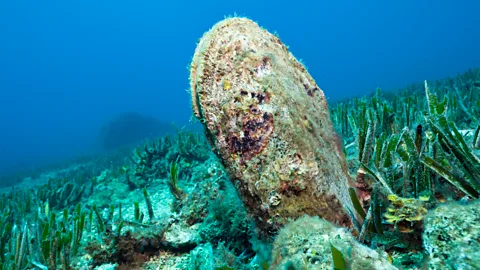 Getty Images
Getty ImagesIn recent years, mass mortality events have ripped through noble pen shell populations in the Mediterranean Sea. Can biologists save this beloved underwater giant?
Diving in the cold November sea near the Croatian coast to check several submerged onion bags hanging on the suspended rope, Croatian marine biologists Silvija Kipson and Sandro Dujmović were in for a surprise.
The improvised larvae collectors, placed here five months earlier, were full of noble pen shells, juvenile specimens of one of the most endangered species in the Mediterranean Sea.
"These meshy bags are a proven method to attract noble pen shell larvae, but chances for their appearance and survival were slim," says Kipson. "It's almost a miracle that we found around 80 alive baby animals."
It was one of the largest juvenile populations discovered in the last seven years, bringing a glimpse of hope that international efforts to preserve this endemic clam, struck by several sudden events of mass mortality since 2016, might be finally paying off.
Fan mussel (pinna nobilis) clams, also known as noble pen shells, are one of the most popular and beloved species in the Mediterranean Sea. An attractive sight on the sea floor, these huge clams can reach 120cm (47in) in height and live for almost half a century.
Their ability to filter water, using the nutrients for food and transforming pollutant particles into pseudofaeces that get deposited on the sea floor, combined with their large size mean they are also an important species for the marine ecosystem. A single clam can filter up to 2,000 litres (440 gallons) per day. Meanwhile, their huge shells serve as small biodiversity hubs, harbouring up to 35 different species.
The charismatic clams have long been cherished, including by ancient Greeks and Romans, who used the filaments that keep the clam attached to the sea floor as expensive sea silk for the clothes of the wealthiest citizens.
Populations of the clams saw some decline through the 20th Century due to fishing and habitat degradation, and were added to several protected species lists. But in 2016, whole previously healthy populations of fan mussels suddenly started dying all across the Mediterranean Sea.
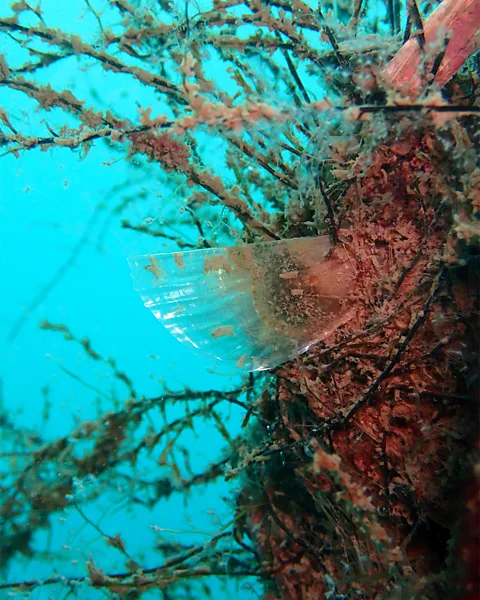 Silvija Kipson
Silvija KipsonJose Rafael Garcia March, a Spanish marine biologist who has devoted himself to studying noble pen shells since 1993, still remembers his disbelief when the first evidence of mass mortality emerged in September 2016.
"A group of Spanish colleagues that were working with fan mussels on the Andalusian coast informed us about the high mortality," he says. "[At] first, we didn't believe it."
His team had conducted a survey a month earlier in August 2016 and found that "everything was fine" with populations, he says. Fan mussel communities have been prone to some degrees of mortality before, says Garcia March – sometimes due to stress during reproduction and sometimes as a result of temperature oscillations brought by the El Niño weather pattern. But these were always "just a temporary occurrence", he says.
"[When] we started to check the populations along the Spanish coast during the winter, we realised they were indeed dying," says Garcia March. "This was something different and permanent."
Their analysis soon found what scientists suspect was the main culprit: a newly described parasite called Haplosporidium pinnae which attacks the digestive systems of the clam. Studies of dead noble pen shell specimens also showed the occasional presence of mycobacterium bacteria.
"The arrival of the new pathogen could be connected with the occurrence of invasive species," says Garcia March. "The fan mussels simply didn't have time to develop a defensive mechanism."
One hypothesis, he adds, is that other pathogens (such as mycobacterium bacteria or others) may have already weakened the immunity of the clams, with the high mortality caused by the combination of different diseases.
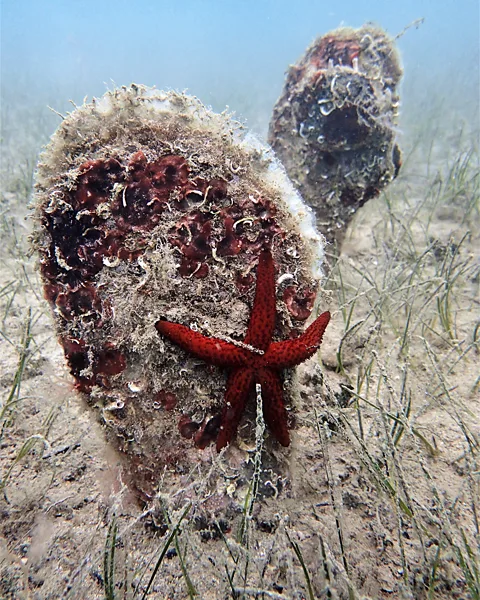 Silvija Kipson
Silvija KipsonRising sea temperatures in the Mediterranean area over the last decades may have played a role too, both by favouring the arrival of invasive species and boosting the population of the Haplosporidium parasite, which studies have shown thrives at a temperature above 13.5C (56.3F).
Carried by the currents, the parasite soon spread across the Mediterranean Sea, causing mass mortality events in coastal areas of France, Italy, Greece, Cyprus, Turkey, Tunisia, Montenegro and Croatia.
The decline of noble pen shell populations was so rapid and extensive that extinction has been now considered plausible. In 2019, the species was flagged as critically endangered in the International Union for Conservation of Nature (IUCN)'s red list of threatened species.
Populations containing a few thousand or a few hundred living specimens currently remain only in a small number of shallow bays and coastal lagoons, such as Ebro Delta and Mar Menor in Spain, the Bassin de Thau lagoon in France, Kalloni Gulf in Greece and the Venetian Lagoon in Italy, says Garcia March. But noble pen shells have been dying there too.
In Croatia, where the clam is so beloved by the public that it recently got its own statue in the coastal town of Supetar, only around 30 living specimens are known to still exist in the open sea.
Since the abrupt decline, many scientists in Mediterranean countries have joined forces to find the right conservation methods through several international projects such as Life pinnarca or Life pinna.
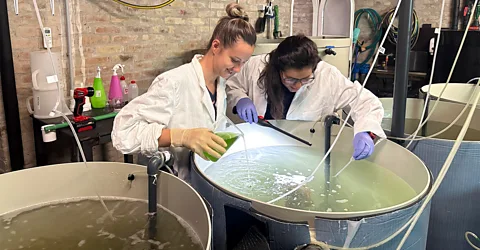 Ilenija Sudulić
Ilenija SudulićCurrently, one of the best bets for boosting population numbers is the protection of juvenile specimens. A first step is submerged larvae collectors, such as those left by Kipson and Dujmović, which help male and female gametes find each other in the same water column. But even when embryos are produced which lead to larvae, these juvenile specimens rarely survive the next few months.
Finding almost 80 alive baby fan mussels in Croatia was a rare and extraordinary event. Most of the discovered specimens were only a few centimetres long, with the smallest one measuring only 8mm (0.3in) in size.
But this was just a beginning of a complex conservation process. "After five months in the sea, many small organisms, including other clam species, inhabit those bags," says Kipson. "You have to be very meticulous to find and carefully extract fragile juvenile fan mussels."
The baby shells were transported to the aquarium in the Croatian city of Pula, one of the only few existing sites in Europe where ex-situ conservation takes place.
"When we get juvenile specimens, we put them into small cups filled with sediment, which are placed in special pools with sterile water," says biologist Milena Mičić, owner of the aquarium.
For the first 30 days, the water temperature is maintained at only 12C (54F) to stop the parasite from spreading. "After that, we have to elevate the temperature slightly, otherwise it is too cold for fan mussels to grow," says Mičić.
This ex-situ method also allows scientists to experiment with the best nutrients for growth – mainly a combination of different microalgae. An algae called Isochrysis galbana is what the baby noble pen shells seem to like the most from the menu so far, says Mičić.
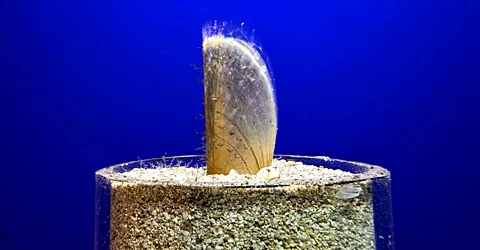 Ilenija Sudulić
Ilenija SudulićKeeping the juvenile specimens alive proved a hard task. Of the 80 animals that were brought to the aquarium last November, half of them died soon after. Analysis, Mičić said, showed all were already infested with Haplosporidium. Today, only 20 of them are still alive.
The biologists, however, keep trying. Last year, the aquarium in Pula celebrated the second birthday of a noble pen shell it has named Morana, which is still alive today. Some specimens in the aquarium located in the Spanish city Murcia, meanwhile, have managed to survive for five years. Rare cases like these leave hope that maturation and even reproduction in captivity is possible.
In the meantime, some scientists are using another approach: searching for adult specimens out on the open sea resistant to disease and transporting them to safe locations in lagoons, in a bid to create a new population capable of reproducing.
The problem is that there are not many safe places left. Sea temperatures are rising due to the effect of climate change, and in summer 2023 saw record-breaking temperatures in parts of the Mediterranean Sea. The heat is favouring the pathogen growth, as well as reducing oxygen levels and stressing the fan mussels, which make them less immune to diseases, says Garcia March.
Last year, drought in the Spanish province of Catalonia resulted in a reduced inflow of fresh water in the Ebro Delta lagoon, which allowed the parasite to spread for the first time through its large remaining fan mussel population, says Garcia March. "Unfortunately, pen noble shells are a convincing bioindicator that something is wrong in the Mediterranean," he adds.
On the other hand, proving this species could be saved or, in an even better scenario, that it could adapt itself to new conditions, would bring huge hope for conservation efforts in the Mediterranean – one of the world's seas most affected by climate change.
--
If you liked this story, sign up for The Essential List newsletter – a handpicked selection of features, videos and can't-miss news, delivered to your inbox twice a week.
